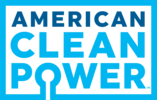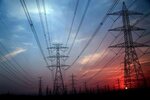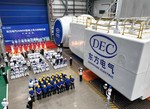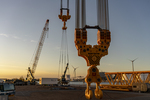News Release from American Clean Power Association (ACP)
Wind Industry Profile of
05/06/2012
AWEA - Wind power progress scheduled to end with PTC expiration
US wind energy rose 1.6GW in Q1 2012. Wind power rose in the US 1695 MW during the first quarter of 2012, taking the country's overall wind farm capacity to 48611 MW with 788 wind turbines according to AWEA.
US Wind Power Industry Installed 1.695 GW In Q1. The US saw 1.695 GW of wind farm capacity installed in the first quarter, with 788 wind turbines added in 17 states, according to American Wind Energy Association.
General Electric installed 200 wind turbines during the first quarter in the US, its top market, giving it an early lead in what could be a banner year for the industry, according to data compiled by the American Wind Energy Association (AWEA).
Gamesa was second with 126 turbines, more than the 77 it installed in all of 2011. Gamesa’s ninth place 2011 US ranking was its worst showing since it began manufacturing operations in Pennsylvania in 2004.
Siemens was third with 110 units installed in the January-March period, followed by Clipper, 97; Goldwind and Vestas, each with 75; Mitsubishi 57; Nordex 30 and the balance from by DeWind, Guodian and PowerWind.
The 788 turbines installed during the first quarter had an average capacity of 2.15MW, up from 1.97MW in all of 2011. GE was a key factor in that trend as it accelerated installations of its 2.5xl turbine at the massive Shepard’s Flat wind farm under construction in Oregon.
Shepard’s will be the world’s largest wind farm at 845MW when completed this year and was lead US customer for the 2.5xl. GE’s first quarter installations there totaled 123 units, up from 82 in fourth quarter 2011. The project will utilize 338 of the turbines.
GE is already the dominant US turbine supplier in the 1.5-1.6MW class. The first quarter also saw Siemens install 18 of its 3MW turbines, an effort by the German vendor to challenge Vestas as the only supplier in that class. Vestas installed 74 3MW units.
Clipper completed deliveries to its major customer BP Wind Energy, installing 90 turbines at the Trinity Hills project in Texas. United Technologies Corporation has placed Clipper up for sale.
China’s turbine manufacturers continued their slow but steady penetration of the US wind market led by Goldwind, which installed 73 1.5MW turbines at the Shady Oaks wind farm in Illinois. The project is being developed by Goldwind and Mainstream Renewable Power. The vendor also installed two additional 1.5MW units at the Cooper Farms project in Ohio.
Guodian broke into the market here by installing six 1.5MW turbines in the Port of Corpus Christi, Texas. There also remains a market for smaller utility-scale turbines as shown by Mitsubishi, which placed 49 1MW units in a California project. Several prominent vendors did not install US turbines in the first quarter including Alstom, REpower and its parent company Suzlon.
1Q wind power results: PTC proves effective at driving wind farm installations. The U.S. saw 1,695 megawatts (MW) of wind energy capacity installed in the first quarter, with 788 additional wind turbines. Once again proving the success of the Production Tax Credit in tandem with continuing technology improvements in creating jobs and driving billions of dollars of private investment, the wind power industry posted one of its busiest first quarters ever, according to the American Wind Energy Association's (AWEA) first-quarter market report for 2012.
The U.S. saw 1,695 megawatts (MW) of wind energy capacity installed in the first quarter, with 788 additional wind turbines—largely made in the USA—producing clean, affordable, power in 17 states. No other first quarter has been as strong for the American wind power industry, which has tapped the Production Tax Credit (PTC), the industry's primary policy driver, to establish a strong and efficient—and still growing—manufacturing supply chain here in the U.S. The 1,695 MW installed brings the total installed wind power capacity in the U.S. to 48,611 MW.
But in spite of the success of the industry and the PTC, policy uncertainty threatens the very future of American wind power. The PTC, which keeps taxes low on one of the greatest sources of new American manufacturing jobs and has broad bipartisan support, is set to expire at the end of the year, and already the supply chain is feeling the effects of the uncertainty. A recent study found that extending the PTC will allow the industry to grow to 100,000 jobs in just four years, while an expiration will eliminate 37,000 jobs.
The wind energy industry installed 52 percent more megawatts in the first quarter than it did the same quarter in 2011. Continuing a trend that became evident at the end of last year, under-construction numbers were also exceptionally strong in the first quarter, clocking in at 8,916 MW, with 2,284 of that total starting construction just this quarter. Also notable: construction is taking place in 31 states and Puerto Rico.
"The last five years have been marked by unprecedented policy stability, and in response wind power has delivered," said AWEA CEO Denise Bode. "American wind power contributed 35 percent of all new electric generating capacity between 2007 and 2011, and today it employs 75,000 people.
"The choice is clear: with policy certainty, we'll grow to 100,000 jobs in just a few years. Without it, 37,000 jobs will disappear, particularly in U.S. wind manufacturing. It's up to Congress to act now and extend the PTC."
As for project development hotspots during the first quarter, California (370 MW), Oregon (308 MW) and Texas (254 MW)were the leading states for adding the most wind power. Rounding out the top 5 were and Washington (127 MW) and Pennsylvania (121 MW).
One notable trend, previously highlighted in AWEA's 2011 annual market report, continued to emerge in the first-quarter numbers: with ever-improving technology, wind power is accessing wind resources in geographic areas considered to have inadequate wind resource just a few years ago. That trend is reflected in the states with the most growth in 2012's first quarter. Top on that list is New Hampshire with a head-turning growth of 388 percent, followed by Arizona (72 percent), Massachusetts (17 percent) and Pennsylvania (15 percent). Wind power veteran Oregon rounded out the top five with 12 percent.
Yet despite the productive first quarter, wind industry jobs remain on the line and layoffs are predicted to start quickly in the industry's supply chain. New graphics, recently released by AWEA, link the 37,000 industry jobs in jeopardy with the industry project development and turbine manufacturing cycle, showing how those jobs would be lost within a year if Congress does not extend the PTC soon.
Just last week, the House Ways and Means Committee met to prioritize a list of possible tax extensions that deserve swift action by Congress. The PTC extension, led by Congressmen Dave Reichert (R-Wash.), Earl Blumenauer (D-Ore.), and Steve King (R-Iowa), was one of the most talked-about pieces of legislation because of the number of jobs at risk, particularly in manufacturing The PTC remains one of the most bipartisan bills in Congress, with 21 House Republicans joining Democrats in supporting the Reichert-Blumenauer bill for an extension. Throwing their support behind the PTC is a broad spectrum of organizations including the U.S. Chamber of Commerce, National Association of Manufacturers, the American Farm Bureau Federation, the Edison Electric Institute, the Western Governors' Association, and the United Steelworkers.
Other highlights of the first quarter and the U.S. Wind Industry First Quarter Market Report 2012 that AWEA released today include the top 5 states for under construction:
1. Kansas-1,340 MW
2. Texas-914 MW
3. Oklahoma-894 MW
4. California- 777 MW
5. Illinois-705 MW
The public version of the AWEA First Quarter Market Report is available here. The full version of the AWEA First Quarter Market Report as part of the AWEA Wind Market Analysis Suite can be accessed by logging into the AWEA Member Center or clicking here. The full version of the quarterly report includes a list of under-construction projects, project activity by region, power purchase agreements, requests for proposals and analysis of power offtake agreements.
The PTC is a tax incentive that helps keep electricity rates low and encourages development of proven clean energy projects. Private investment generated over the last five years of relative PTC stability averages $15.5 billion to as much as $20 billion a year.
The wind energy PTC will expire at the end of in 2012 unless Congress takes action. Failure to extend the PTC would lead to job losses and will put the brakes on the progress America has made to include clean, affordable, homegrown energy as part of the U.S. electricity portfolio.
Facing the threat of the PTC expiring, wind project developers have become hesitant to plan future U.S. projects and American manufacturers have seen a marked decrease in orders. The wind industry is facing the recurrence of the boom-bust cycle it saw in previous years when the PTC was allowed to expire. In the years following expiration, installations dropped by between 73 and 93 percent, resulting in major job losses.
For more information on this article or if you would like to know more about what www.windfair.net can offer, please do not hesitate to contact Trevor Sievert at ts@windfair.net
www.windfair.net is the largest international B2B Internet platform – ultimately designed for connecting wind energy enthusiasts and companies across the globe!
Please follow the following link (copy and paste) access further information:
www.awea.org/learnabout/publications/reports/upload/AWEA_First_Quarter_2012_Market_Report_Public.pdf
US Wind Power Industry Installed 1.695 GW In Q1. The US saw 1.695 GW of wind farm capacity installed in the first quarter, with 788 wind turbines added in 17 states, according to American Wind Energy Association.
General Electric installed 200 wind turbines during the first quarter in the US, its top market, giving it an early lead in what could be a banner year for the industry, according to data compiled by the American Wind Energy Association (AWEA).
Gamesa was second with 126 turbines, more than the 77 it installed in all of 2011. Gamesa’s ninth place 2011 US ranking was its worst showing since it began manufacturing operations in Pennsylvania in 2004.
Siemens was third with 110 units installed in the January-March period, followed by Clipper, 97; Goldwind and Vestas, each with 75; Mitsubishi 57; Nordex 30 and the balance from by DeWind, Guodian and PowerWind.
The 788 turbines installed during the first quarter had an average capacity of 2.15MW, up from 1.97MW in all of 2011. GE was a key factor in that trend as it accelerated installations of its 2.5xl turbine at the massive Shepard’s Flat wind farm under construction in Oregon.
Shepard’s will be the world’s largest wind farm at 845MW when completed this year and was lead US customer for the 2.5xl. GE’s first quarter installations there totaled 123 units, up from 82 in fourth quarter 2011. The project will utilize 338 of the turbines.
GE is already the dominant US turbine supplier in the 1.5-1.6MW class. The first quarter also saw Siemens install 18 of its 3MW turbines, an effort by the German vendor to challenge Vestas as the only supplier in that class. Vestas installed 74 3MW units.
Clipper completed deliveries to its major customer BP Wind Energy, installing 90 turbines at the Trinity Hills project in Texas. United Technologies Corporation has placed Clipper up for sale.
China’s turbine manufacturers continued their slow but steady penetration of the US wind market led by Goldwind, which installed 73 1.5MW turbines at the Shady Oaks wind farm in Illinois. The project is being developed by Goldwind and Mainstream Renewable Power. The vendor also installed two additional 1.5MW units at the Cooper Farms project in Ohio.
Guodian broke into the market here by installing six 1.5MW turbines in the Port of Corpus Christi, Texas. There also remains a market for smaller utility-scale turbines as shown by Mitsubishi, which placed 49 1MW units in a California project. Several prominent vendors did not install US turbines in the first quarter including Alstom, REpower and its parent company Suzlon.
1Q wind power results: PTC proves effective at driving wind farm installations. The U.S. saw 1,695 megawatts (MW) of wind energy capacity installed in the first quarter, with 788 additional wind turbines. Once again proving the success of the Production Tax Credit in tandem with continuing technology improvements in creating jobs and driving billions of dollars of private investment, the wind power industry posted one of its busiest first quarters ever, according to the American Wind Energy Association's (AWEA) first-quarter market report for 2012.
The U.S. saw 1,695 megawatts (MW) of wind energy capacity installed in the first quarter, with 788 additional wind turbines—largely made in the USA—producing clean, affordable, power in 17 states. No other first quarter has been as strong for the American wind power industry, which has tapped the Production Tax Credit (PTC), the industry's primary policy driver, to establish a strong and efficient—and still growing—manufacturing supply chain here in the U.S. The 1,695 MW installed brings the total installed wind power capacity in the U.S. to 48,611 MW.
But in spite of the success of the industry and the PTC, policy uncertainty threatens the very future of American wind power. The PTC, which keeps taxes low on one of the greatest sources of new American manufacturing jobs and has broad bipartisan support, is set to expire at the end of the year, and already the supply chain is feeling the effects of the uncertainty. A recent study found that extending the PTC will allow the industry to grow to 100,000 jobs in just four years, while an expiration will eliminate 37,000 jobs.
The wind energy industry installed 52 percent more megawatts in the first quarter than it did the same quarter in 2011. Continuing a trend that became evident at the end of last year, under-construction numbers were also exceptionally strong in the first quarter, clocking in at 8,916 MW, with 2,284 of that total starting construction just this quarter. Also notable: construction is taking place in 31 states and Puerto Rico.
"The last five years have been marked by unprecedented policy stability, and in response wind power has delivered," said AWEA CEO Denise Bode. "American wind power contributed 35 percent of all new electric generating capacity between 2007 and 2011, and today it employs 75,000 people.
"The choice is clear: with policy certainty, we'll grow to 100,000 jobs in just a few years. Without it, 37,000 jobs will disappear, particularly in U.S. wind manufacturing. It's up to Congress to act now and extend the PTC."
As for project development hotspots during the first quarter, California (370 MW), Oregon (308 MW) and Texas (254 MW)were the leading states for adding the most wind power. Rounding out the top 5 were and Washington (127 MW) and Pennsylvania (121 MW).
One notable trend, previously highlighted in AWEA's 2011 annual market report, continued to emerge in the first-quarter numbers: with ever-improving technology, wind power is accessing wind resources in geographic areas considered to have inadequate wind resource just a few years ago. That trend is reflected in the states with the most growth in 2012's first quarter. Top on that list is New Hampshire with a head-turning growth of 388 percent, followed by Arizona (72 percent), Massachusetts (17 percent) and Pennsylvania (15 percent). Wind power veteran Oregon rounded out the top five with 12 percent.
Yet despite the productive first quarter, wind industry jobs remain on the line and layoffs are predicted to start quickly in the industry's supply chain. New graphics, recently released by AWEA, link the 37,000 industry jobs in jeopardy with the industry project development and turbine manufacturing cycle, showing how those jobs would be lost within a year if Congress does not extend the PTC soon.
Just last week, the House Ways and Means Committee met to prioritize a list of possible tax extensions that deserve swift action by Congress. The PTC extension, led by Congressmen Dave Reichert (R-Wash.), Earl Blumenauer (D-Ore.), and Steve King (R-Iowa), was one of the most talked-about pieces of legislation because of the number of jobs at risk, particularly in manufacturing The PTC remains one of the most bipartisan bills in Congress, with 21 House Republicans joining Democrats in supporting the Reichert-Blumenauer bill for an extension. Throwing their support behind the PTC is a broad spectrum of organizations including the U.S. Chamber of Commerce, National Association of Manufacturers, the American Farm Bureau Federation, the Edison Electric Institute, the Western Governors' Association, and the United Steelworkers.
Other highlights of the first quarter and the U.S. Wind Industry First Quarter Market Report 2012 that AWEA released today include the top 5 states for under construction:
1. Kansas-1,340 MW
2. Texas-914 MW
3. Oklahoma-894 MW
4. California- 777 MW
5. Illinois-705 MW
The public version of the AWEA First Quarter Market Report is available here. The full version of the AWEA First Quarter Market Report as part of the AWEA Wind Market Analysis Suite can be accessed by logging into the AWEA Member Center or clicking here. The full version of the quarterly report includes a list of under-construction projects, project activity by region, power purchase agreements, requests for proposals and analysis of power offtake agreements.
The PTC is a tax incentive that helps keep electricity rates low and encourages development of proven clean energy projects. Private investment generated over the last five years of relative PTC stability averages $15.5 billion to as much as $20 billion a year.
The wind energy PTC will expire at the end of in 2012 unless Congress takes action. Failure to extend the PTC would lead to job losses and will put the brakes on the progress America has made to include clean, affordable, homegrown energy as part of the U.S. electricity portfolio.
Facing the threat of the PTC expiring, wind project developers have become hesitant to plan future U.S. projects and American manufacturers have seen a marked decrease in orders. The wind industry is facing the recurrence of the boom-bust cycle it saw in previous years when the PTC was allowed to expire. In the years following expiration, installations dropped by between 73 and 93 percent, resulting in major job losses.
For more information on this article or if you would like to know more about what www.windfair.net can offer, please do not hesitate to contact Trevor Sievert at ts@windfair.net
www.windfair.net is the largest international B2B Internet platform – ultimately designed for connecting wind energy enthusiasts and companies across the globe!
Please follow the following link (copy and paste) access further information:
www.awea.org/learnabout/publications/reports/upload/AWEA_First_Quarter_2012_Market_Report_Public.pdf
- Source:
- American Wind Energy Association
- Author:
- Posted by Trevor Sievert, Online Editorial Journalist / AWEA Staff
- Email:
- windmail@awea.org
- Link:
- www.awea.org/...
- Keywords:
- awea, wind, wind energy, wind turbine, rotorblade, awea, ewea, wind power, suppliers, manufacturers, renewable energy, trevor sievert
All news from American Clean Power Association (ACP)
news in archive
Related News
China, Brazil Partnership
11/21/2024


























